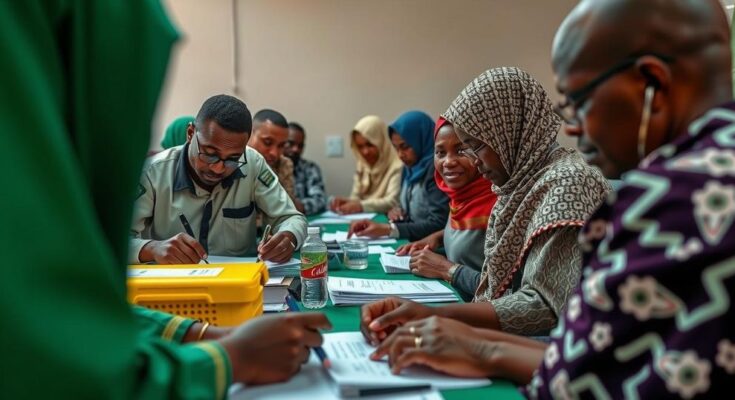Vote counting is underway in Somaliland after presidential elections, with polls closing peacefully and reports of over 1 million voters participating. NEC anticipates results by November 21, amid geopolitical tensions with Somalia and Ethiopia over a controversial agreement regarding coast access and recognition. Incumbent president Muse Bihi Abdi is among three candidates aiming to enhance democracy and economic growth in the breakaway region confirmed to have an orderly electoral process.
The vote counting process in Somaliland has commenced following the successful conclusion of presidential elections. According to the Somaliland National Electoral Commission (NEC), polling stations closed at 6 p.m. local time, with over 1 million registered voters participating at approximately 2,000 locations. NEC Chairman Muse Hassan Yusuf reported that minor technical issues were efficiently addressed and expressed confidence in the orderly progression of results, expected by November 21. General Mohamed Adan Saqadhi of the Somaliland Police confirmed a peaceful electoral environment, declaring, “Thanks to Allah, the election took place democratically and peacefully. No incident was reported.” Three candidates contested the election, including incumbent President Muse Bihi Abdi of the ruling Kulmiye party, who is seeking a second term, and challengers Abdirahman Mohamed Abdullahi of the Waddani party and Faisal Ali Warabe of the UCID party. In their campaigns, all candidates pledged to enhance Somaliland’s economy, strengthen democratic processes, and pursue international recognition, which the territory has sought for over three decades since declaring independence in 1991. This election occurs amid heightened tensions involving Somaliland, Somalia, and Ethiopia. A recent agreement grants Ethiopia a long-term lease on a section of the Gulf of Aden coastline, and this controversial arrangement has provoked disputes with the Somali government, which perceives it as a breach of its sovereignty. Efforts to mediate the situation through dialogue have not yet yielded a resolution, further escalating the complexities surrounding Somaliland’s political landscape and its aspirations for recognition.
Somaliland, a self-declared republic since 1991, has maintained a functional government and democratic systems, despite lacking international recognition. The region arose amidst the collapse of the Siad Barre regime and has established unique political structures that enable peaceful transitions of power between parties. The recent presidential elections, involving three candidates, underscore the ongoing pursuit of economic development and democratic integrity amidst geopolitical tensions with Somalia and Ethiopia.
The recent presidential elections in Somaliland mark a significant event for its democratic processes and aspirations for international recognition. Despite societal tensions linked to the Ethiopia-Somaliland deal, the electoral proceedings were reportedly peaceful, indicating a commitment to democracy in the region. The outcome of the elections will be pivotal in determining Somaliland’s future political and economic trajectory, particularly as it seeks to navigate the complexities of regional relations.
Original Source: www.voanews.com




